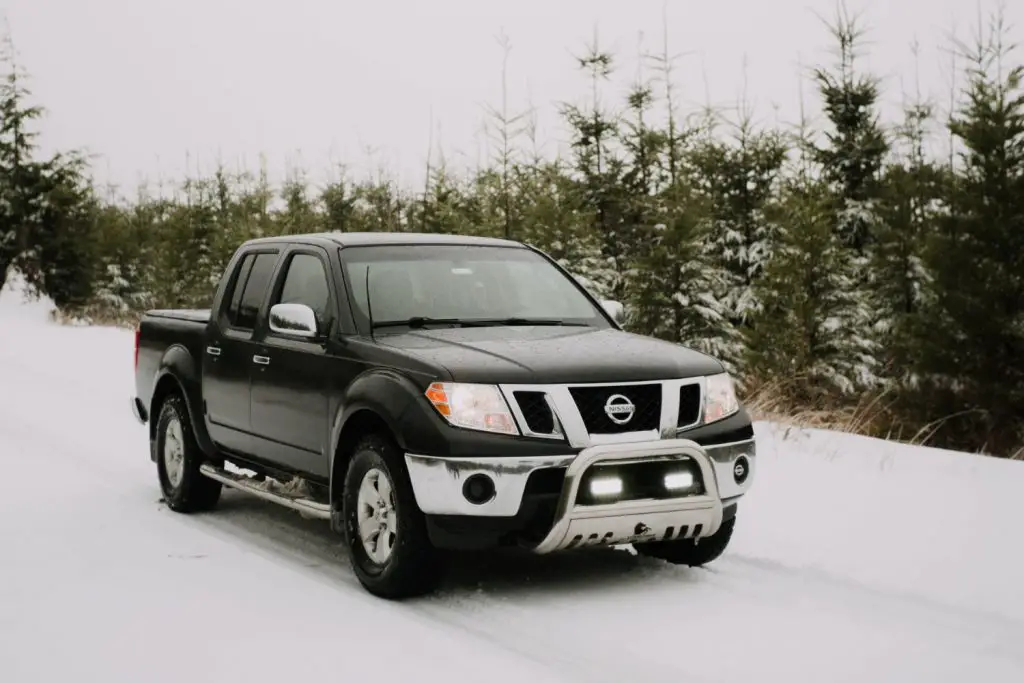We are all looking to save a bit of money, both on the purchase of a pickup truck, but also at the pump! If that sounds like you, you are in the right place! We found the nine best older pickup trucks (from the 2000s and earlier) that have both the best gas mileage, but also should give you the best bang for your buck. We of course also ranked them by which ones we would buy, to the ones we would also buy (buy maybe not quite as much)… give me a break, I’m a car enthusiast, and would likely buy any vehicle.
So without more to do, here are the 9 best older pickup trucks with awesome gas mileage that you should be looking at in your truck buying journey!
1. Toyota Tundra | 2005 – 2006
Gas Mileage: 18 city / 22 highway
Toyota has long been a reliable source of pickup trucks with great gas mileage that are still a great value. In 2005, the first generation Tundra (which had been around since 2000) got an upgraded 4.0-liter engine, which resulted in considerably better gas mileage of 18 miles around town, and up to 22 miles per gallon on the highway. If you are looking for a Tundra with great gas mileage, these years are the one to get.
This 4.0 engine has gone on to not only be one of the better gas mileage engines, but also one of the most reliable as well. No matter what platform they put it into, it results in great gas mileage, and even better reliability.
While I am not a huge fan of the styling of the Tundra in this generation (interior and exterior), you have to give credit where its due, as this is a fantastic truck if you are looking for an inexpensive pickup. Of course, if you have a bit higher budget, you should definitely opt for the generation after this (starting in 2007), as it was a big jump in features and styling, but also size, and still had decent gas mileage as well (17 city / 20 highway).
2. Ford Ranger | 2001 – 2006
Gas Mileage: 24 city / 29 highway

The Ford Ranger wasn’t always the mid-size pickup that it is today. In fact, before it was discontinued in 2012 (only to be revived in 2019) it was a compact pickup truck that was meant more for work, than for the lifestyle truck that it is today.
With that compact pickup proportions came better gas mileage as well. This little truck got up to 29 miles per gallon (yep, you read that right) on the highway, and easily sat at around 24 miles per gallon putting around town. These are sedan numbers, but you have a pickup truck bed in the back (by the way, here are the best truck bed organizers for you, you are welcome).
Of course, unlike the truck we know today, this one didn’t have nearly as many amenities, and its acceleration matched that as well (almost 8 seconds, zero to sixty). It was very much a work truck, and not much more. However, if you’re looking for a used pickup that is inexpensive and has great gas mileage, this is a fantastic option. I have had a decent amount of experience with this generation of Ranger, and it is an awesome little pickup, and is well worth its price.
3. Honda Ridgeline | 2006 – 2016
Gas Mileage: 16 city / 21 highway
The Ridgeline burst onto the scene with a lukewarm reception, as it turned the pickup truck world upside down. As one of the first unibody non-truck-based pickup trucks, instead, it shared its platform with crossovers like the Acura MDX, and the minivan Honda Odyssey. While this did impact its capabilities around towing and hauling, it made up for it in ride quality, and of course gas mileage.
While similar standard pickup trucks were sitting in the low teens for their combined gas mileage, the Ridgeline reached up to 21 miles per gallon on the highway and did its reliability. Much like Toyota, Honda is well known for its reliability, and the 3.5 Liter engine in this truck is very much the same. You can find these trucks for a reasonable value used, yet likely with high mileage.
One of the awesome things about this pickup, is that you can get an earlier first generation Ridgeline for a budget price, and with a bit of work, make it look just as nice as a 2016, as they didn’t change much on the truck between when it was released in 2006, and when the generation ended in 2016.
4. Ford Explorer Sport Trac | 2002 – 2005
Gas Mileage: 16 city / 21 highway
The Explorer Sport Trac was a bit of an oddity when it came out, as it was essentially an SUV with a pickup truck bed in the back. It shared its platform with the Explorer SUV (it was essentially an Explorer from the rear doors forward), and as such got great gas mileage for the time.
While trucks have come a long way since the early 2000s in terms of gas mileage, you can still find these trucks for a reasonable price and get great gas mileage for their time, at 21 miles per gallon on the highway, and 16 in the city.
While the Sport Trac surprisingly had a second generation, it unfortunately didn’t last too long until dismal sales caused it to move to discontinuation. I think they were a bit ahead of their time, as I really do like these little pickups.
5. Toyota Pickup | 1992 – 1997
Gas Mileage: 22 city / 26 highway

While the rest of the world called this the Toyota Hilux, we called it the Toyota Pickup (so original I know). It was later turned into what we know as the Toyota Tacoma, but before that, it was a no-nonsense truck with great gas mileage. It also makes a fantastic off-road rig, with a ton of aftermarket support, if you are in need of that.
The trucks were available in both 4×2 and 4×4, had great gas mileage in the city at 22 miles per gallon, and they could get up to 26 miles per gallon on the highway. That is not too shabby for a truck that was built to last and could take a beating.
If you are looking for a used truck that is going to get great gas mileage, be reliable, and not break the bank, this is a great option. That said, from pickups on this list, this is one of the older ones, and was back when pickups were more tools than people movers, and the amenities match that sentiment.
6. Chevrolet S10 | 1994 – 2004
Gas Mileage: 22 city / 28 highway
The Chevrolet S10 is another great option when it comes to trucks with great gas mileage. It is very similar to the Toyota Pickup in terms of its capabilities and its gas mileage. Of course, nothing can match Toyota’s reliability though. The S10 was on the same platform and shared parts of its name with the Blazer for a short period as well.
The trucks were available in both 4×2 and 4×4 variants and had great gas mileage. The trucks could get up to 28 miles per gallon on the highway, which is not too shabby for a truck that is nearly 20 years old (at its newest).
If you are looking for a used truck that is going to get great gas mileage, be reliable, and not break the bank, this is a great option.
7. Nissan Frontier | 2001 – 2021
Gas Mileage: 22 city / 25 highway

The Nissan Frontier is a mid-size pickup truck that has been in production since 1998. It was originally designed as a replacement for the Nissan Hardbody, which was a compact pickup truck. However, the Frontier is still considered to be a compact pickup truck in today’s market. It wasn’t until 2005 that the Frontier received a significant redesign to become the truck we know and love today.
The last generation of Frontier trucks (ranging from 2001 to 2021) boasts great gas mileage. The trucks can get up to 26 miles per gallon on the highway, and around 21 miles per gallon in the city. That is not too bad for a truck that can still pack a punch. That said, much like the Ridgeline from earlier, I would recommend getting a Frontier from earlier in this generation of pickup, as little changed between the different facelifts, and they offer a great value.
One of the biggest drawbacks to this mid-size pickup is its dismal turn radius. I have had a chance to drive one of these for quite a while, and you find yourself having to make 3-point turns to get into normal parking spots.
8. Subaru Baja | 2002 – 2006
Gas Mileage: 20 city / 26 highway
Yes, this list is full of strange pickup trucks! However, these strange ones always tend to have the best gas mileage, and the lowest prices. The Subaru Baja was based on the Subaru Outback, which is why it has such great gas mileage. It was a unique pickup truck that never really found its footing in the market. It only lasted for four years before it was discontinued.
While it didn’t have the towing capacity or payload capacity of other trucks on this list, it made up for it in gas mileage. The Baja could get up to 26 miles per gallon on the highway, which is not too bad for a small truck
The Baja was created mainly as a naturally aspirated engine vehicle, however they did make a turbo version for a short period of time. The best of the best version was the manual turbo Baja, so keep an eye out for that.
This AWD, car based pickup can make a great value for those that don’t need a ton of “pickupness” in their truck.
9. Nissan Hardbody | 1985 – 1997
Gas Mileage: 20 city / 25 highway
The Nissan Hardbody was a compact pickup truck that was in production from 1985 to 1997. It was replaced by the Frontier, which is still in production today (and we talked about earlier). The Hardbody was available in both 4×2 and 4×4 variants, and it had a variety of engine options. Due to its simplistic, and small stature, this pickup could get some awesome gas mileage, getting all the way up to 25 miles per gallon on the highway.
The main downside to these pickups, is that it was rooted in the 80s, which meant little to no real features, outside of a heater and an engine. If you like that, then this is an awesome option for you! However, if you are looking for a few more amenities, you might want to look higher up on this list.
Conclusion
If you are in the market for a used truck, there are a lot of great options out there. However, if you are looking for a truck with great gas mileage, these are some of the best options. So, if you are looking for a used truck that won’t break the bank, and will get great gas mileage, any of these trucks would be a great option.





